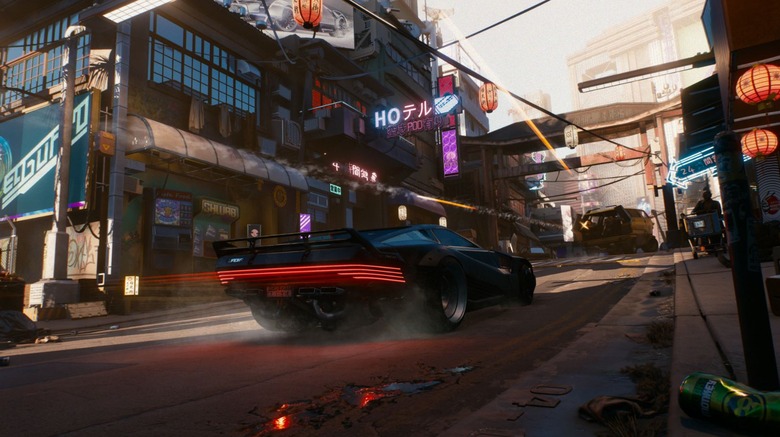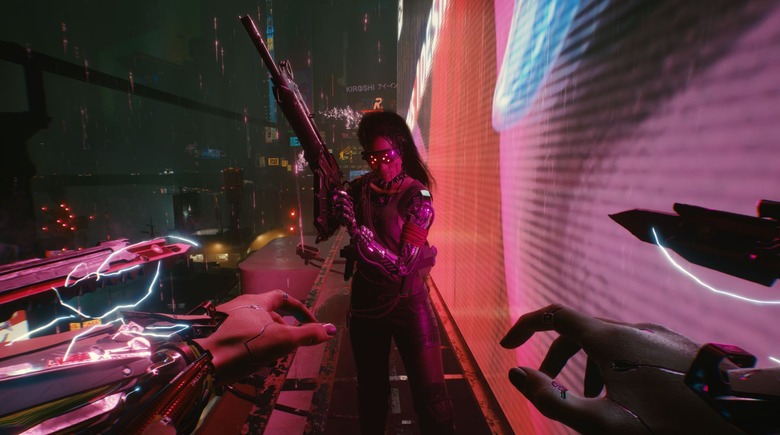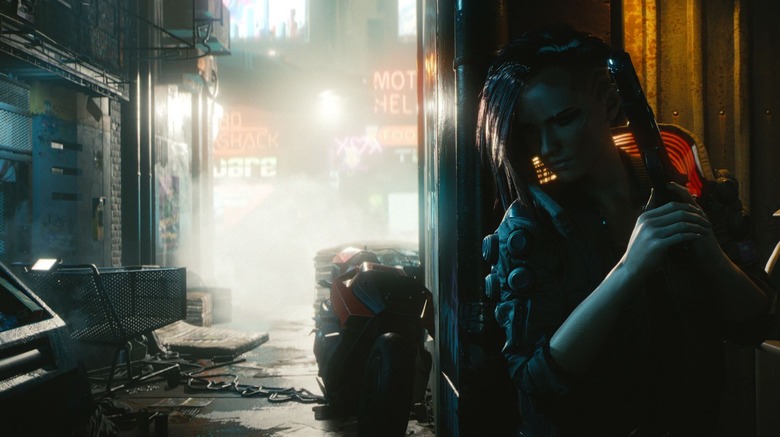Cyberpunk 2077 Is More Proof We Should Stop Pre-Ordering Games
It's been a turbulent few days for the Cyberpunk 2077 community. After years and years of waiting, Cyberpunk 2077 finally launched, with the game going live across different regions and platforms throughout the day yesterday. While you'll find a mix of reactions from the gamers who have been looking forward to Cyberpunk 2077 sprinkled across the internet, there's been one glaring blemish with this launch: the console versions.
It seems that a lot of PS4 and Xbox One gamers are experiencing massive issues with Cyberpunk 2077, and you don't have to look very hard to find evidence of it. The game seems to be nearly unplayable on Xbox One S and PlayStation 4, and – while the experience does get a little better on enhanced last-gen consoles like the Xbox One X and the PlayStation 4 Pro, and much better on PlayStation 5 and Xbox Series X – it isn't hard to imagine that most console players are looking to play on Xbox One S or either the original PS4 or PS4 Slim.
There's no two ways about it – if you bought the game on Xbox One or PlayStation 4 and you're playing it on a base console, you probably feel like you received a dud. The game seems to be in a very bad state on PS4 and Xbox One, and even those who are playing on other platforms are reporting a number of issues ranging from bugs to crashes to blurry textures.

It's clear that Cyberpunk 2077 needed more time in the oven, and while these problems can hopefully be fixed with a series of post-launch updates and patches, it's really a shame that the game launched in this state. Like No Man's Sky or Fallout 76 or Anthem or Mass Effect: Andromeda before it, Cyberpunk 2077 is serving as another reminder that it is never in your best interest to pre-order video games, because even good developers miss the mark sometimes.
Am I saying that Cyberpunk 2077 is a bad game? No, I'm not – I haven't played it long enough to form an opinion on whether or not the game is good. However, I will note that Cyberpunk 2077 can be a good game that is ultimately held back by bugs and performance issues, and judging by the reviews and reactions that have been circulating thus far, that seems to be the case.
Even if there is a good game lurking beneath the mess, there's no escaping the fact that Cyberpunk 2077 probably shouldn't have been released on PlayStation 4 and Xbox One. It's disappointing to have to say that, and I'm sure it's disappointing to read it, but when there are outlets reporting average framerates in the low-to-mid 20s and even in the teens when this game is running an Xbox One S or PlayStation 4, we're definitely venturing into "unplayable" territory.
Speaking of reviews, we had little warning that Cyberpunk 2077 would be this way on consoles because it seems that all of the pre-release reviews were done on PC. If you head over to Metacritic, you'll find a grand total of 52 published reviews for the PC version and none at all for the Xbox One and PlayStation 4 versions of the game. The fact that CD Projekt Red only provided review codes for the PC version of the game should have been a major red flag that something was severely wrong with the PS4 and Xbox One versions, and if I had a pre-order for either version, I would have cancelled it the moment I learned that outlets didn't receive any console codes.
I think as gamers we tend to get too invested in games in the lead up to release. We see trailers and watch presentations containing carefully curated content and we buy into the hype because we want these games to be good. Why wouldn't you want something like Cyberpunk 2077 to be good? It promises a futuristic open world steeped in technology, which sounds totally awesome. Then you also have the fact that it comes from CD Projekt Red, which after The Witcher 3 is a company associated with making really good games.

It's hard not to get excited. I catch myself doing it all the time and it's my job to critique these games. I, more than anyone, should know the pitfalls of jumping aboard the hype train, but it's a hard impulse to stop sometimes.
Getting excited for a game is fine, but I would stress that you shouldn't start believing a game is good before it's actually out in the wild. In the hours and days after a game launches, you can pretty quickly find out if it's worth spending money on. Not only are there usually plenty of reviews by then, but there tends to be other early adopters who are publishing feedback about the game to sites like Reddit, or you can visit Twitch and YouTube to see the actual game – not an ad put together by the publisher – in action.
The point is: you can usually have a good idea if a game is worth the money mere hours after it releases. It costs you nothing to adopt a "wait and see" approach to buying new games, even ones you're convinced are going to be among the greatest games of all time. In my view, there is zero upside to pre-ordering a game, because you're essentially rewarding good marketing that shows you the best possible version of that game. As Cyberpunk 2077 proves, that's something you may or may not get come launch day.

On the flipside, there are no drawbacks to waiting just a couple of hours post-launch to pull the trigger on that game purchase. It might mean that you don't get to play it the second it goes live, but if it's between that and making sure that my $60 is going to go toward a game that is unquestionably worth that price tag, I will take the latter every single time.
Pre-orders used to be important back in the days before internet-connected gaming when there were only a limited number of copies to go around. These days, even if physical copies of a game sell out (which is something that's exceedingly rare), you can still buy the game you want digitally. There's no limit on the number of copies a developer can sell digitally, unless of course we're talking about a certain gaming company that seems to think selling limited digital releases is a good idea.
When you pre-order a game, you're doing nothing but taking a publisher at their word that the game you're buying is going to be good. I'm here to tell you that the publisher's word – any publisher's, even ones you like, even the ones who have put out good work in the past – is ultimately worth nothing, so stop giving them money for games sight unseen. Trust me, the awesome games will still be awesome if you don't pre-order them, while the bad games will quickly become a thing of the past for you, and that's a beautiful thing.
